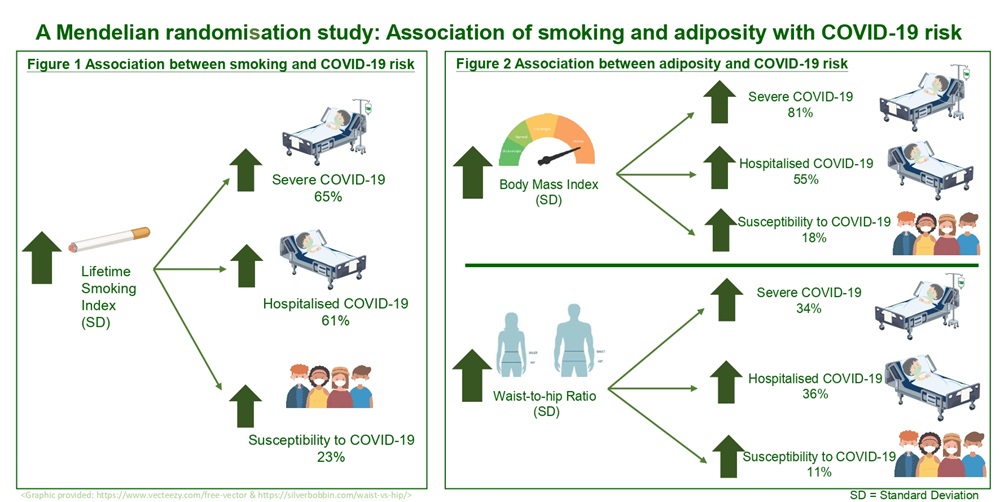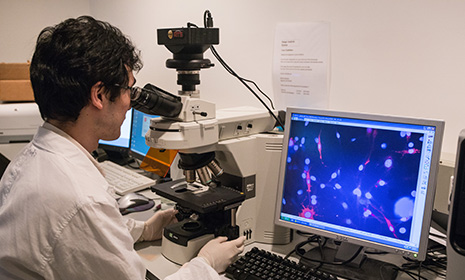A joint HKU-CUHK study confirms smoking and obesity increase risk of severe COVID-19 by 65-81%
Researchers from the School of Public Health, LKS Faculty of Medicine of The University of Hong Kong (HKUMed), in collaboration with The Chinese University of Hong Kong (CUHK)’s Faculty of Medicine (CU Medicine), confirmed smoking, obesity and lower socioeconomic position (SEP)1 likely increase the risk of contracting mild to severe COVID-19, using data from large scale genome-wide association studies. Other exposures thought to be related to COVID-19 risk, such as glycaemic traits, type 2 diabetes, and vitamin D, are likely unrelated. The researchers also found angiotensin-converting enzyme 2 (ACE2), the key receptor of SARS-CoV-2, mediates part of the detrimental effect of obesity and SEP. The findings have been published in the Journal of Medical Virology, a peer-reviewed virology journal. [link to the publication]
Background
Epidemiologic studies show a variety of factors related to increased risk of COVID-19, such as type 2 diabetes2, although paradoxical findings have also been reported, such as an inverse association of smoking with COVID-19 severity3. However, these associations may not be causal due to limitations in observational studies. Using better designs to understand the determinants of COVID-19 risk would be particularly important to devise effective mitigation measures to reduce the risk of COVID-19 in the population.
In this regard, the research team conducted a comprehensive assessment of the role of multiple risk factors (vitamin D, glycaemic traits, blood pressure, smoking, obesity and SEP) in various severities of COVID-19 risk using a method called Mendelian randomisation. As genetic variants are used, this approach might circumvent some of the limitations of conventional observational epidemiologic studies. The research team also explored whether ACE2 mediates any of these detrimental effects.
Research methods and findings
Using Mendelian randomisation, researchers extracted genetic variants related to the various risk factors described above (N<=3,037,499), and assessed their relationship with COVID-19 risk using large genetic summary data from genome-wide association studies (N<=2,942,817). The use of such large datasets also helps assess if previous negative findings on risk factors reported in smaller Mendelian randomisation studies, such as type 2 diabetes and vitamin D4, were due to the small sample size.
The research team found that smoking, obesity and lower SEP likely increase the risk of COVID-19.
For example, one standard deviation increase (SD) of body mass index (BMI) likely
- increases risk of severe COVID-19 by 81%
- Increases risk of COVID-19 hospitalisation by 55%
- increases risk of contracting COVID-19 by18%
Strong social gradations were also found in COVID-19 risks, with people of lower SEP tending to have a higher risk of all forms of COVID-19. Previous findings on the harms associated with smoking were also confirmed. ‘Using a less biased design, our study confirms the importance of smoking and obesity in increasing the risk of contracting all forms of COVID-19. Our study also shows that targeting ACE2 may be a way to mitigate the risk of COVID-19 among those who are obese or overweight, or of low SEP, and may help inform corresponding drug development,’ said Dr Ryan Au Yeung Shiu-lun, Assistant Professor, Division of Epidemiology and Biostatistics of the School of Public Health, HKUMed.
‘SARS-CoV-2 enters the host cells via ACE2. Recently, various therapeutic approaches have been developed for COVID-19 patients with the utilisation of ACE2-modulating medications to effectively control viral entry. Our findings will enhance research into several therapeutic targets for COVID-19 treatment,’ said Professor Kwok Kin-on, Assistant Professor, the Jockey Club School of Public Health and Primary Care, CU Medicine.
Research significance
This is one of the largest studies to explore the role of various risk factors in different severities of COVID-19 using Mendelian randomisation. It reiterates the relevance of obesity and smoking, which are key factors contributing to disease burden, according to the World Health Organization. ‘The strong social gradient associated with COVID-19 risk highlights clearly the inequalities embedded in societies that need to be urgently addressed, and it is likely relevant to other diseases too,’ added Dr Au Yeung.
‘It is understandable that smokers and people who have high BMI may have difficulty in quitting smoking or losing weight immediately to reduce their COVID-19 risk. Therefore, these high-risk groups are strongly encouraged to receive the booster dose of the COVID-19 vaccine as soon as possible to mitigate any severe COVID-19 outcomes. This study highlights the importance of genomics and big data analytics in understanding the causes of diseases. In particular, it is an exemplar of enhancing the understanding of the interaction between infectious diseases and non-communicable diseases,” said Professor Kwok.
About the research team
The research was conducted by a team co-led by Dr Ryan Au Yeung Shiu-lun, Assistant Professor, Division of Epidemiology and Biostatistics, School of Public Health, HKUMed; and Professor Kwok Kin-on, Assistant Professor, the Jockey Club School of Public Health and Primary Care, CU Medicine. Other members of the research team from the School of Public Health of HKUMed include Dr Tommy Wong Hon-ting, Senior Research Assistant; Dr He Baoting, Post-doctoral Fellow; and Dr Luo Shan, Post-doctoral Fellow.
- Socioeconomic position is a measure of a person’s income, education and occupation in relation to others.
- Williamson, E.J., Walker, A.J., Bhaskaran, K. et al. Factors associated with COVID-19-related death using OpenSAFELY. Nature 584, 430–436 (2020). https://doi.org/10.1038/s41586-020-2521-4
- Min Gao, Paul Aveyard, Nicola Lindson, Jamie Hartmann-Boyce, Peter Watkinson, Duncan Young, Carol Coupland, Ashley K Clift, David Harrison, Doug Gould, Ian D Pavord, Margaret Smith, Julia Hippisley-Cox, Association between smoking, e-cigarette use and severe COVID-19: a cohort study, International Journal of Epidemiology, Volume 51, Issue 4, August 2022, Pages 1062–1072, https://doi.org/10.1093/ije/dyac028
- Shan Luo, Ying Liang, Tommy Hon Ting Wong, Catherine Mary Schooling, Shiu Lun Au Yeung, Identifying factors contributing to increased susceptibility to COVID-19 risk: a systematic review of Mendelian randomization studies, International Journal of Epidemiology, Volume 51, Issue 4, August 2022, Pages 1088–1105, https://doi.org/10.1093/ije/dyac076
About the School of Public Health, HKUMed
The School of Public Health, LKS Faculty of Medicine of The University of Hong Kong has a long and distinguished history in public health education and high-impact research. With world-leading research in infectious diseases as well as on non-communicable diseases of both local and global importance, the School has made significant contributions through its research and advocacy to improve the health of populations and individuals, both locally and globally. The School is a leading research and teaching hub in public health on influenza and other emerging viruses, control of non-communicable and infectious diseases, tobacco control, air pollution, psycho-oncology, behavioural sciences, exercise science, life-course epidemiology, population mental health, and health economics, health services planning and management. This work has informed international (e.g. the US Food and Drug Administration, Health Canada, the World Health Organization), national and local public health policies.
About the Jockey Club School of Public Health and Primary Care, CU Medicine
The Jockey Club School of Public Health and Primary Care of the Faculty of Medicine at The Chinese University of Hong Kong is a leading centre of public health education and research that was established in 2001 to provide the broad-based education in public health, primary care, and family medicine. The School currently provides advanced professional training across a comprehensive range of public health disciplines that include Epidemiology, Biostatistics, Environmental Health, Health Policy, Health Services Management, Social Behaviour and Global Health. Our ongoing mission is to improve the health of populations through cutting-edge research and collaboration with leading research institutions around the world.









.png)
